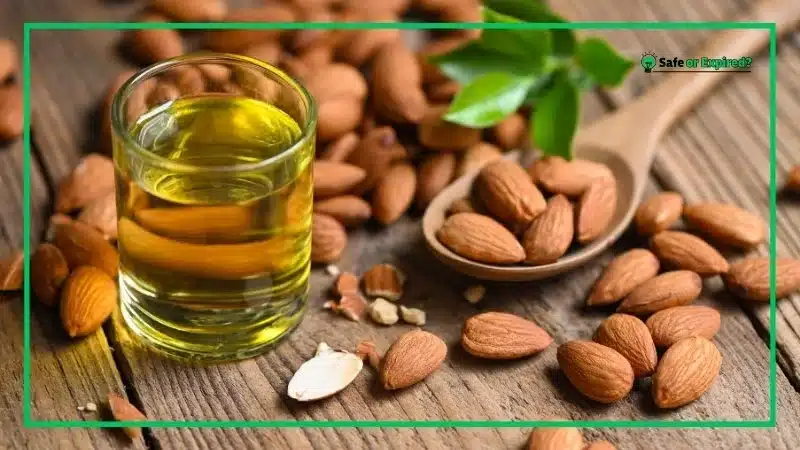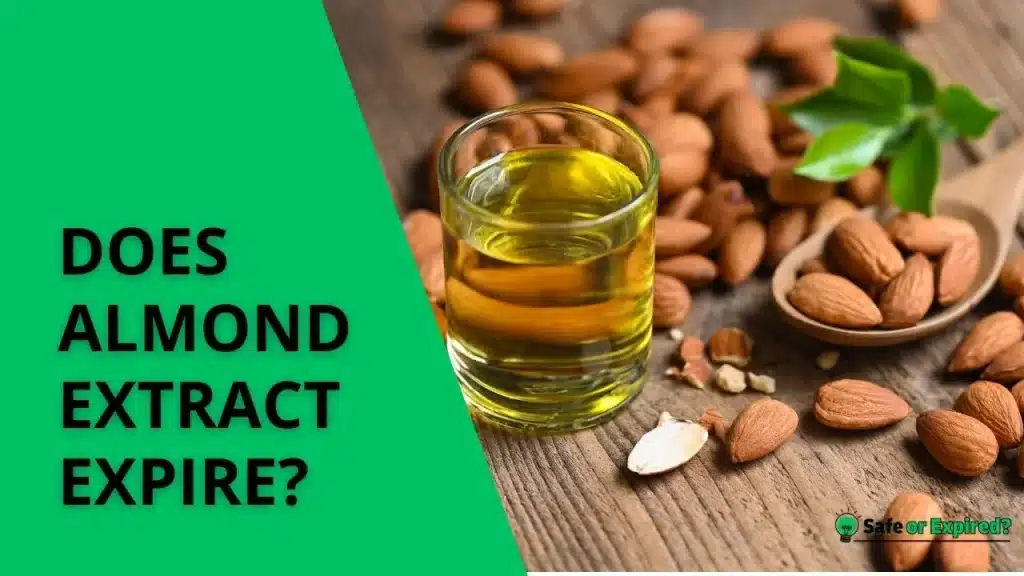“Does almond extract expire?” is the first thing that comes to mind when we see an old package. The answer is it does expire, but it’s important to know when it’s time to replace it. Don’t go anywhere; you will find all the details here.
Let’s explore how you can ensure your almond extract remains fresh and effective, and why it matters for your cooking and baking adventures.
Does Almond Extract Expire?
The almond extract does expire. While it generally remains safe to use beyond its expiration date due to its alcohol content, its flavor potency can decrease over time. It is essential to store it properly. Furthermore, check for signs of spoilage before using it.
People often ask, “Does almond extract expire in fridge?” Yes, it does. However, storing almond extract in the fridge can extend its shelf life. Refrigeration helps preserve the flavor and potency of the extract.
You may now want to know, “How long does almond extract expire?” Almond extract typically expires within 3 to 4 years under normal storage conditions. The expiration date on the bottle can serve as a guideline. However, the actual shelf life might vary depending on storage practices and the quality of the extract.
Another query people ask is, “How long does almond extract last after opening?” Once opened, almond extract can last up to 4 years when stored properly.

Here’s a table about almond extract expiry to sum up the details:
| Storage Location | Opened | Unopened |
| Counter | 3-4 years | 4-5 years |
| Fridge | 4-5 years | 5+ years |
Why Does Almond Extract Have a Long Shelf Life?
Almond extract has a long shelf life primarily due to its high alcohol content. The alcohol content in the extract acts as a natural preservative, as it inhibits bacterial and mold growth. Additionally, its sealed packaging minimizes exposure to air and moisture. This further prevents oxidation and flavor degradation.
Alcohol Content Preserves Flavor and Quality
Almond extract typically contains a high percentage of alcohol, which acts as a natural preservative. Alcohol is effective at inhibiting the growth of bacteria and mold, which can cause spoilage. This preservation quality helps maintain the extract’s flavor and aroma over extended periods.
Sealed Packaging Limits Exposure
The way almond extract is packaged also contributes significantly to its long shelf life. Typically housed in tightly sealed bottles, it is protected from exposure to air and moisture. Limiting oxygen exposure reduces the risk of oxidation, which can degrade the quality.
Dark and Cool Storage Conditions
Keeping the extract in a cool place or cupboard away from direct sunlight helps to preserve its integrity. Light or heat can cause the flavors to break down more quickly, reducing the shelf life.
Natural Stability of Flavor Compounds
The natural components of almond extract are relatively stable. These flavor compounds do not easily degrade unless subjected to adverse conditions. These can be excessive heat or direct light.
How Long Does Almond Extract Last After Expiration Date?
Almond extract can last several years beyond its expiration date if stored properly. The reason is the alcohol content, which acts as a preservative. While it remains safe to consume, the intensity of its flavor may decline over time. It’s important to check for any changes in smell or appearance.
But typically, almond extract can still be used in cooking and baking without health risks, even a few years past the expiration date. This goes for both homemade and commercially-made almond extract.

How To Tell If Almond Extract Is Bad? Look For These Signs
To determine if almond extract has gone bad, check for an off smell, unusual cloudiness, or a color change. Sediment at the bottom or a weakened flavor are also indicators of spoilage. If you notice any of these signs, it is best to discard the extract.
Unusual Odor
A clear sign that almond extract is no longer good to use is a noticeable change in its smell. Fresh almond extract should have a rich, sweet, and distinctly nutty aroma. If the extract smells sour, musty, or just plainly off, it’s a strong indicator that it has degraded and should not be used.
Visual Changes
Visually inspect your almond extract for any changes. Fresh almond extract should be relatively clear with a slight amber hue. Any signs of cloudiness, sediment, or changes in color to a darker, murkier shade suggest that the extract has been compromised.
These visual changes can occur due to exposure to:
- Heat
- Light
- Air.
Taste Alteration
If the smell and appearance seem normal, but you’re still unsure, do the small taste test. Almond extract that has gone bad might lose its vibrant almond flavor. It tastes either excessively bitter or just bland. If the flavor doesn’t taste as potent as it once did, or if it tastes off in any way, it’s best not to use it in your cooking.
Checking the Expiration Date
Almond extract can last past its expiration date, but this date is still a helpful guide. If your almond extract is several years past this date or shows signs of spoilage, it’s best to replace it.
Can Expired Almond Extract Make You Sick?
Expired almond extract is unlikely to make you sick because it doesn’t spoil like fresh food. However, if it smells off or looks cloudy, it’s better not to use it. Although it might not be harmful, its quality and flavor could be reduced, which can affect your cooking.
Alcohol Keeps It Safe
The almond extract contains alcohol, which stops bacteria and mold from growing. This means that even if your almond extract is old, it probably won’t make you sick. The alcohol is like a natural preservative, keeping the extract safe for a long time.
Quality Might Drop, But Not Safety
The main issue with old almond extract isn’t safety; it’s about how it tastes. Over time, the flavor can fade. While this won’t hurt you, it could make your recipes less tasty. If you’re looking for great flavor, you might want to use a fresher bottle.
It’s essential to ensure your food is both high-quality and safe. Worry not; find out how to achieve this balance in “Balancing Food Quality and Safety.”
When to Throw It Out
If your almond extract smells weird, looks cloudy, or tastes off, it’s best to throw it out. Not because it’s unsafe but because it won’t make your food taste good. Always use the best ingredients for the best results.
Storing It Right
To keep your almond extract good for as long as possible, store it in a cool, dark place. Make sure the cap is tight. This way, you’ll get the most out of it, even after the expiration date.
People also ask, “Can almond extract kill you?” No, almond extract cannot kill you. Almond extract is made primarily from either natural almond oil or synthetic benzaldehyde. The concentration of any potentially harmful components is very low, making it safe for culinary uses.
Also, remember that safe food handling according to established guidelines is essential for health. Discover important protocols in “Food Safety Guidelines from Leading Institutions.”
How to Extend the Life of Almond Extract?
To extend the life of almond extract, store it in a cool, dark place, keep the cap tightly sealed, and use clean utensils for measuring. Refrigeration is optional but can help preserve its quality longer, especially in warmer climates.
Store in a Cool, Dark Place
Keeping almond extract in a cool, dark place is crucial for maintaining its quality. Exposure to heat sources or light can degrade the extract’s flavors more quickly. A pantry or a cabinet away from the stove or other heat sources is ideal.
All in all, knowing the right ways to store and preserve food can make all the difference. For practical tips, see “Best Practices for Storing and Preserving Food.”
Keep the Cap Tightly Sealed
After using almond extract, make sure the cap is tightly sealed. This prevents air or moisture from entering the bottle, which can lead to oxidation and flavor loss. A tight seal helps preserve the extract’s potent aroma and taste.
Use Clean Utensils
When measuring out almond extract, use a clean spoon or measuring tool each time. Introducing food particles or water into the extract can introduce bacteria, potentially spoiling it. Keeping the extract uncontaminated ensures it stays fresh longer.
Consider Refrigeration
While not necessary, refrigerating almond extract can further extend its shelf life, especially in warmer climates. Cold temperatures slow down the degradation process, keeping the extract fresher for a longer period.
That’s it. Now, you can significantly extend the life of your almond extract. Before signing off, know that there’s a lot of outdated or incorrect advice about how to keep food fresh. Find out what’s really true in “Dispelling Myths in Food Preservation.”
Conclusion
The almond extract does expire, and it’s crucial you know all about its shelf life if you don’t want to face any frustration. Remember these points:
- Proper Storage: Store almond extract in a cool, dark place with the cap tightly sealed.
- Shelf Life: Almond extract typically remains potent and safe to use long after its expiration date, thanks to its alcohol content.
- Quality Check: Regularly check your almond extract for signs of spoilage.
- Usage Tips: Use clean utensils to avoid contaminating the extract, which can affect both its flavor and shelf life.
- Refrigeration Option: While not necessary, refrigerating almond extract can further prolong its quality, especially in warm environments.
By following these guidelines, you can ensure that your almond extract remains a reliable and flavorful addition to your cooking and baking arsenal.

